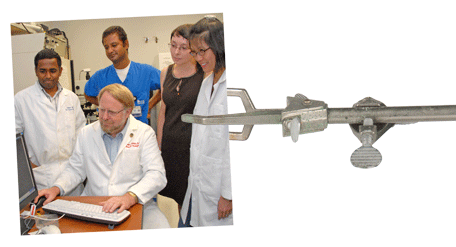Extramural training grants
One of the strengths of the College of Graduate Studies is its dual-degree training programs and training grants. Through partnerships with other colleges at MUSC, including medicine, pharmacy, and dental medicine, the College offers dual-degree programs designed to prepare students to become independent investigators who will work in research environments at universities, for the government, or with industry.

The following two training grants exemplifies the high quality of the training programs offered through the College of Graduate Studies and its faculty.
Training to Improve Cardiovascular Drug Therapy:
Since 1975 this NIH-funded training grant has been extraordinarily successful in training both pre- and post-doctoral students. In its most recent competing renewal it received a perfect score of ten, a testimony to the faculty, the current program director, Dr. Donald Menick, and the trainees. As of 2011, there have been 130 trainees funded by this grant. The first program director for the training grant was Dr. Thomas E. Gaffney, professor and chairman of pharmacology.
Comprehensive Training in Oral and Craniofacial Research:
This NIH-funded program initiated in 2001 was recently competitively renewed, receiving the top priority score of all the training grants in the study section in which it was reviewed, reflecting the outstanding leadership of the program director, Dr. Keith L. Kirkwood and its faculty, and trainees. This program was originally started by Dr. Steven London, a former member of the College of Dental Medicine.
Funding of trainees by extramural competitive training grants:
As of 2011, the college had at least seventeen extramural competitive training grants that supported 63 pre-doctoral trainees and 58 postdoctoral trainees. Currently, approximately 80 percent of the college’s pre-doctoral trainees are funded via competitive intramural grants or individual training grants. Pre-doctoral trainees obtain the most competitive NIH individual fellowships at an 80 percent success rate, compared to the national average of about 30 percent.
